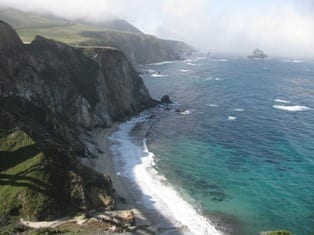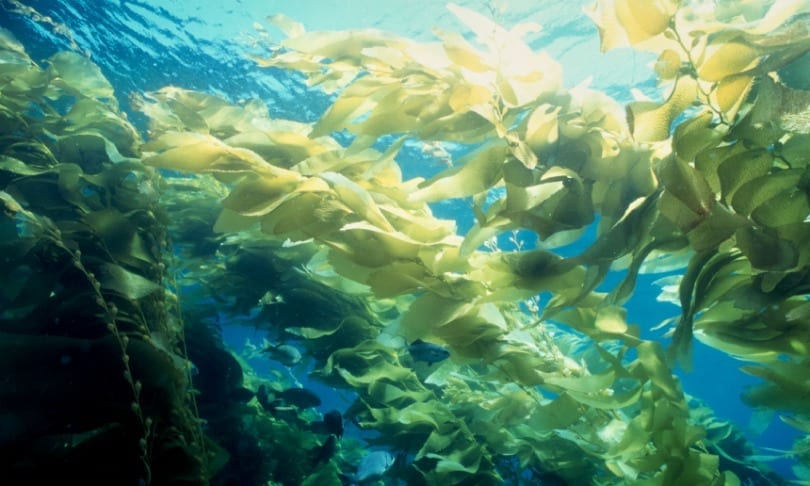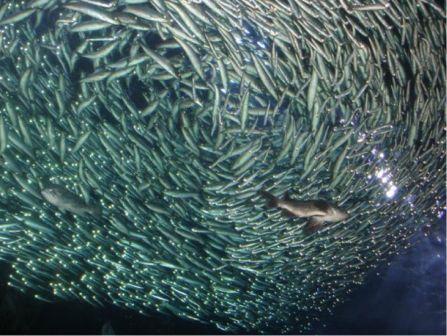
Locally, changes in coastal ocean temperatures may be much more extreme than global averages imply.
New research published in the June 18 edition of Public Library of Science (PLoS ONE) entitled “Decadal Changes in the World’s Coastal Latitudinal Temperature Gradients,” is highlighting some of the distinct regional implications associated with global climate-change. By looking at changes in coastal ocean temperatures over the past 30 years, Dr. Hannes Baumann in the Stony Brook University School of Marine and Atmospheric Sciences (SoMAS) and Dr. Owen Doherty of Scripps Institution of Oceanography (SoMAS alumnus) mapped the differences in how the world’s coastlines are experiencing climate change, and discuss the possible large scale ecological implications of this.
Their results showed a great regional diversity in warming and cooling patterns. For example, the South American Pacific coasts have been cooling over the last few decades. To some, these cooling trends may be counterintuitive, but they are consistent with global climate change predictions, such as increases in upwelling (i.e., a process that brings cold, deep ocean water to the coast).
In the North Pacific and North Atlantic, however, there has been warming trend. In some areas, the authors detected changes in temperature of +/-2.5 degrees Celsius, which is 3 times higher than the global average. Climate change is happening everywhere – just not necessarily at the same rate, or even in the same direction.” For example, if you live on Cape Cod, your conditions are warming three times faster than global averages imply, while in Santiago, Chile, coastal waters have been getting cooler.
“The world is getting flatter,” said Baumann. “Coastal waters at high (cold) latitudes warm much faster than at low (warm) latitudes, hence the majority of the world’s coastal temperature gradients are getting shallower. This could cause dramatic reorganization of organisms and ecosystems, from small plankton communities to larger fish populations.
The Latest Bing News on:
Rate of Temperature Change Along World’s Coastlines
- Mussel shells off Connecticut's coast are getting less dense. Here's why scientists are concernedon April 26, 2024 at 5:00 pm
Leanne Melbourne, a postdoctoral fellow at the museum, chose mussels to study because they are common along ... marine world.” Vriesman said that it was hard to tell how the evolutionary history of ...
- Mastercard: When It Comes to Reforestation, One Tree Does Not Fit Allon April 25, 2024 at 8:43 am
The Priceless Planet Coalition is partnering with Emirates Nature-World Wildlife Fund to restore 50,000 mangrove trees along the Arabian Gulf. In addition to capturing carbon, these mangroves protect ...
- Hello puffins, goodbye belugas: changing Arctic fjord hints at our climate futureon April 24, 2024 at 5:00 pm
Far north of the Arctic Circle lies a fjord on the front lines of climate change. Geir Wing Gabrielsen has been visiting this inlet, located on the northwest side of the Norwegian archipelago Svalbard ...
- WMO report: Asia hit hardest by climate change and extreme weatheron April 24, 2024 at 1:28 am
Climate change has exacerbated the frequency and severity of such events that profoundly impact societies, economies, and, most importantly, human lives, she underscored.
- UN climate report: PHL warming at faster rateon April 23, 2024 at 9:10 am
ASIAN countries like the Philippines are warming faster than the global average, according to a new report from the World Meteorological Organization (WMO). In the State of the Climate in Asia 2023 ...
- Can Aging U.S. Nuclear Power Plants Withstand More Extreme Weather?on April 23, 2024 at 2:55 am
To reach its climate goals, the Biden administration aims to extend the lives of U.S. nuclear reactors. But a new report finds regulators have not studied whether increasingly extreme weather could ...
- Asia world's most disaster-prone region in 2023: WMOon April 22, 2024 at 10:58 pm
Asia continued to bear the brunt of weather, climate and water-related hazards in 2023, making it the world's most disaster-hit region, according to a new report by the World Meteorological ...
- Warming Waters Heat Summer’s Feast Well Before It Gets To The Kitchenon April 22, 2024 at 1:34 pm
David Reidmiller, Director of the Climate Center at the Gulf of Maine Research Center in Portland, Maine, has found that the rates of ocean warming in the Gulf of Maine are three times the global ...
- In 1898, the first scientific expedition to the Antarctic nearly ended in disaster, here's what it can teach us about the region's plummeting sea iceon April 22, 2024 at 9:30 am
In 1898, the crew of the first scientific expedition to Antarctica became trapped inside sea ice around the southernmost continent. Much of that once thick ice is dwindling, says polar researcher ...
- How climate change impacts Virginiaon April 22, 2024 at 3:00 am
After nine consecutive winters warmer than normal, Virginia is now having one of its 10 warmest starts to a calendar year on record. As the climate continues to warm in the decades to come, Virginia ...
The Latest Google Headlines on:
Rate of Temperature Change Along World’s Coastlines
[google_news title=”” keyword=”Rate of Temperature Change Along World’s Coastlines” num_posts=”10″ blurb_length=”0″ show_thumb=”left”]
The Latest Bing News on:
Coastal ocean temperatures
- How many atmospheric rivers drenched the West Coast this winter? Hint: It's a big numberon April 27, 2024 at 6:01 am
The most powerful storm system slammed into California in early February, inundating Los Angeles with record rainfall.
- Cebu temperatures to hit 40°C as scorching weather persistson April 27, 2024 at 3:59 am
The searing heatwave continues in Metro Cebu and the rest of the province as temperatures are expected to soar and the maximum heat index is projected to peak at 40 degrees Celsius on Saturday, April ...
- Mussel shells off Connecticut's coast are getting less dense. Here's why scientists are concernedon April 26, 2024 at 5:00 pm
The effect was most pronounced in places where the mussels were exposed to the biggest change in spring and summer ocean surface temperature since the early ... “I’ve done a lot of my work on the west ...
- Understanding Maine's springtime sea breeze and its impact on the coaston April 26, 2024 at 3:20 pm
It’s that time of year again in Maine, a time when the sea breeze kicks up and the coastline cools off during the afternoon.
- A few coastal showers this weekend + breezy!on April 26, 2024 at 2:23 pm
YEAH, AND THEY’RE GOING TO BE HEADED THERE THIS WEEKEND, ALTHOUGH THERE MAY BE A FEW SHOWERS AROUND ON SATURDAY, ESPECIALLY IN OUR NORTHERN COUNTIES, FLAGLER AND VOLUSIA. BUT I THINK SUNDAY DOES LOOK ...
- A marine sanctuary 100 miles off the Gulf Coast is one of the healthiest as ocean temperatures riseon April 25, 2024 at 9:36 am
A coral reef 100 miles off the Texas Gulf Coast is doing better than others that are facing ... She said shallow reefs have a harder time with rising ocean temperatures. “That’s not to say that we don ...
- Global ocean temperatures are hitting record highs. What does that mean for SC estuaries?on April 24, 2024 at 5:00 pm
The analysis compared surface-water temperatures over 737 estuaries across the planet and found nearly half of them were warming to various degrees. Of the American estuaries vulnerable to surface ...
- Climate change threatens the coastal Gullah Geecheeon April 24, 2024 at 7:12 am
Residents of coastal Gullah Geechee communities are at risk of losing their homes with more frequent storm surges, rising sea levels and other impacts of climate change.
- From the coast to the deep sea, changing oxygen levels affect marine life in different wayson April 23, 2024 at 10:50 am
Earth's atmosphere maintains a constant level of oxygen, whether it is a wintry, rainy day or hot summer. Across the ocean, oxygen concentrations vary enormously between different places and over time ...
- How climate change is harming the coastal culture of the Gullah Geecheeon April 23, 2024 at 10:15 am
Climate change and warming ocean temperatures are threatening the preservation of the Gullah Geechee coastal communities in the United States. NBC News’ Brie Jackson reports on how flooding, storm ...
The Latest Google Headlines on:
Coastal ocean temperatures
[google_news title=”” keyword=”coastal ocean temperatures” num_posts=”10″ blurb_length=”0″ show_thumb=”left”]











